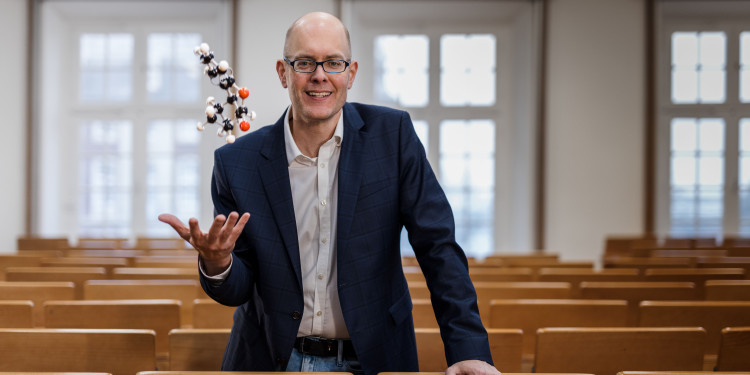
‘Catalysis reduces the ecological footprint’
Sustainable development is a challenge that scientists at the University of Münster are also taking up. Chemist Prof. Dr. Frank Glorius and his research group are organising an international symposium on sustainability in chemistry for the third time. It will take place on 21 August in the university's castle. The main topic is catalysis. Interested parties are welcome to attend, but online registration is required as places are limited. Around 300 people have registered so far. In an interview with Brigitte Heeke, Frank Glorius provides insights and explains why change in chemistry is so important.
The main topic of the upcoming conference is catalysis, which is used to control and accelerate reactions. Can this technology contribute to more sustainable chemistry?
As one of twelve principles of “green chemistry”, which includes, for example, waste prevention, catalysis enables more resource-efficient production. A medicine you take, a cosmetic product you apply, synthetic fibres in the functional clothing you wear: all of these have to be chemically manufactured. Catalysis reduces the ecological footprint by requiring less energy for such production processes. This key technology has already won numerous Nobel Prizes and is a hot topic in science.
The University of Münster is hosting “Dream Reactions” for the third time. What new developments can we expect?
For the first time, we are presenting a sustainability award associated with the symposium, the Green Dream Reaction Award. The award winner, Francesca Grisoni from Eindhoven University of Technology in the Netherlands, has developed machine learning methods for the so-called de novo design of functional molecules, thereby making a significant contribution to the main topic.
And which speakers do you expect to provide particular inspiration?
Opening speakers Matthias Beller from the LIKAT Catalysis Institute in Rostock and Javier Pérez-Ramírez from ETH Zurich will show how chemical transformations can have a significant impact on sustainable chemical production, even on a “planetary scale” – in line with the saying “think globally, act locally”. Haritz Sardon, who conducts research at the Spanish Polymat University of the Basque Country, will explain how plastic recycling can be improved. Finally, Francesca Grisoni will address the potential of previously undiscovered or uncharacterised substances in her presentation. We are all eagerly awaiting these insights.
